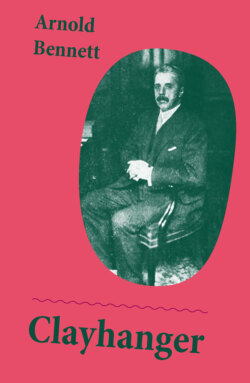Читать книгу Clayhanger (Unabridged) - Arnold Bennett - Страница 63
На сайте Литреса книга снята с продажи.
Three.
ОглавлениеEdwin, quite unaware that he was an instrument in the hands of his Auntie Clara’s Providence, left the shop without due excuse and passed down the long blue-paved yard towards the printing office. He imagined that he was being drawn thither simply by his own curiosity—a curiosity, however, which he considered to be justifiable, and even laudable. The yard showed signs that the unusual had lately been happening there. Its brick pavement, in the narrow branch of it that led to the double gates in Woodisun Bank (those gates which said to the casual visitor, ‘No Admittance except on Business’), was muddy, littered, and damaged, as though a Juggernaut had passed that way. Ladders reclined against the walls. Moreover, one of the windows of the office had been taken out of its frame, leaving naught but an oblong aperture. Through this aperture Edwin could see the busy, eager forms of his father, Big James, and Chawner. Through this aperture had been lifted, in parts and by the employment of every possible combination of lever and pulley, the printing machine which Darius Clayhanger had so successfully purchased in Manchester on the day of the free-and-easy at the Dragon.
At the top of the flight of steps two apprentices, one nearly ‘out of his time,’ were ministering to the engine, which that morning did not happen to be running. The engine, giving glory to the entire establishment by virtue of the imposing word ‘steam’, was a crotchety and capricious thing, constant only in its tendency to break down. No more reliance could be placed on it than on a pampered donkey. Sometimes it would run, and sometimes it would not run, but nobody could safely prophesy its moods. Of the several machines it drove but one, the grand cylinder, the last triumph of the ingenuity of man, and even that had to be started by hand before the engine would consent to work it. The staff hated the engine, except during those rare hours when one of its willing moods coincided with a pressure of business. Then, when the steam was sputtering and the smoke smoking and the piston throbbing, and the leathern belt travelling round and round and the complete building a-tremble and a-clatter, and an attendant with clean hands was feeding the sheets at one end of the machine and another attendant with clean hands taking them off at the other, all at the rate of twenty copies per sixty seconds—then the staff loved the engine and meditated upon the wonders of their modern civilisation. The engine had been known to do its five thousand in an afternoon, and its horse-power was only one.
